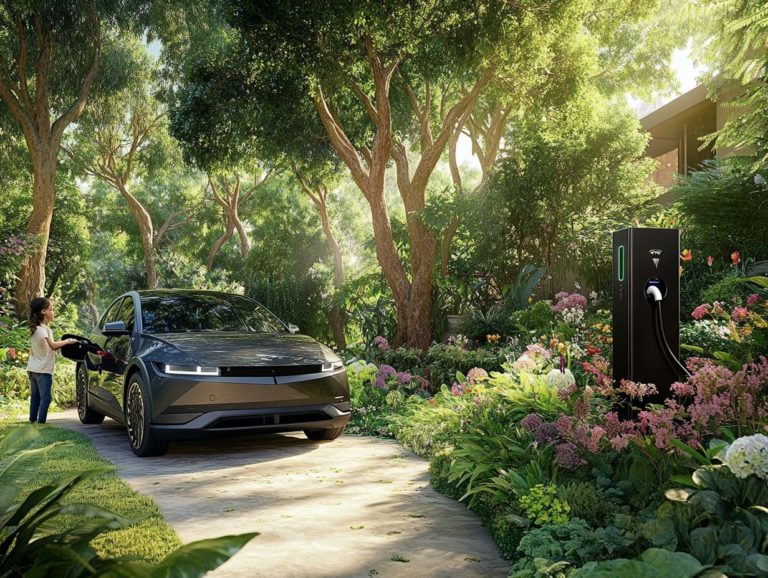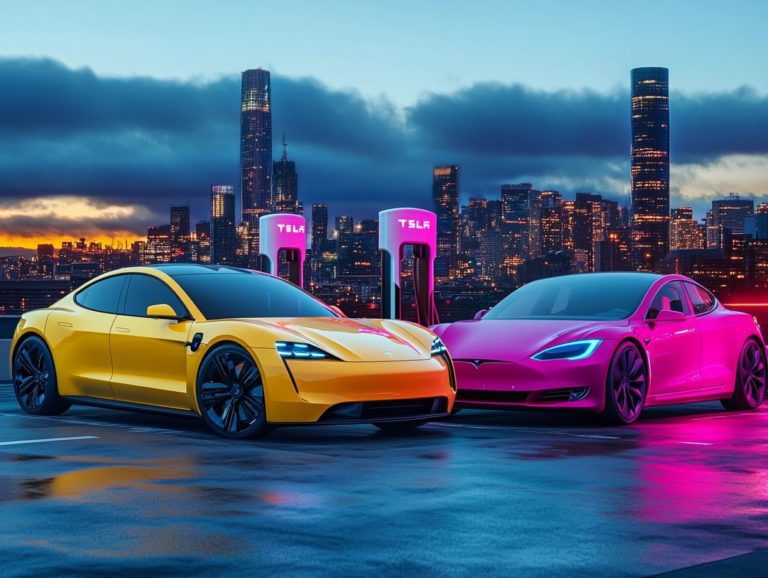How to Choose Between Hybrid and Electric
As the automotive landscape continues to evolve, deciding between hybrid and electric cars can seem daunting. Both options offer eco-friendliness and fuel efficiency; each serves different needs and preferences.
Get ready! This article will reveal the exciting essentials of hybrid and electric vehicles, illuminating their key technological and performance differences. It also addresses crucial factors to consider cost, maintenance, and environmental impact.
By the time you finish reading, you’ll be well-equipped with the insights necessary to make an informed choice that aligns perfectly with your lifestyle.
Contents
- Key Takeaways:
- Comparison of Hybrid and Electric Cars
- Factors to Consider When Choosing Between Hybrid and Electric
- Making the Decision: Which is Right for You?
- Frequently Asked Questions
- 1. How do I decide between buying a hybrid or an electric car?
- 2. What is the main difference between a hybrid and electric car?
- 3. Which option is more environmentally friendly: hybrid or electric?
- 4. Are there any cost differences between a hybrid and electric car?
- 5. Can I take a hybrid or electric car on a long-distance road trip?
- 6. How can I determine the best choice for me: hybrid or electric?
Key Takeaways:
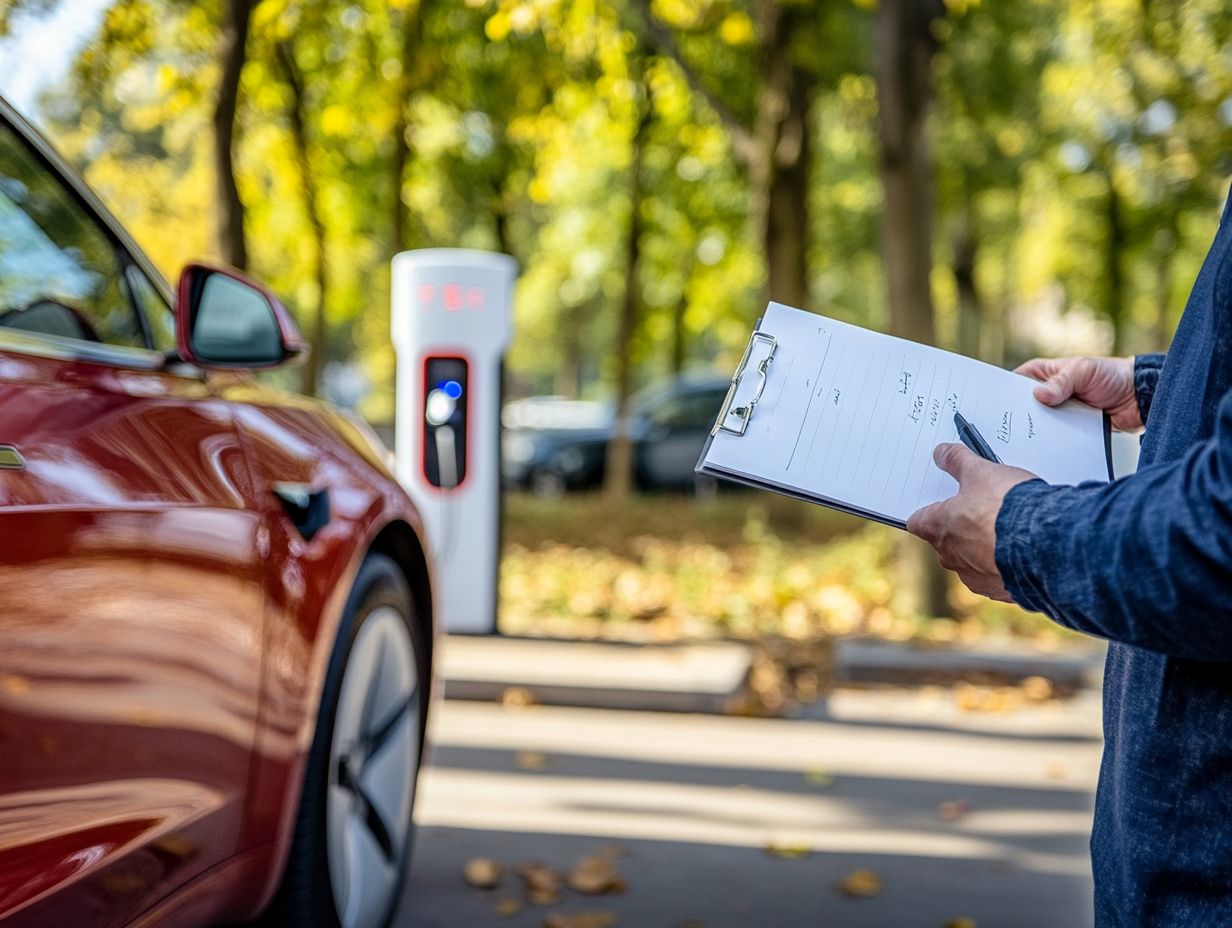
- Evaluate your priorities to determine which car is right for you – consider factors like cost, maintenance, and environmental impact.
- Test drive and research models to get a better understanding of the technology and performance differences between hybrids and electric cars.
- Think about your driving habits and needs when making the decision between hybrid and electric – do you have a long commute, need a high range, or have access to charging stations?
What is a Hybrid Car?
Hybrid cars, or Hybrid Electric Vehicles (HEVs), blend traditional gasoline engines with electric motors, offering you a highly efficient and environmentally friendly way to get around.
This innovative powertrain helps you save on fuel costs and significantly reduces emissions, making hybrids an increasingly appealing choice for today s discerning car owners.
Beyond their eco-friendly appeal, these vehicles provide a seamless transition between power sources, ensuring that your driving experience is both smooth and responsive.
The benefits of lower emissions extend beyond just environmental considerations; they often come with tax incentives, making hybrid technology a smart financial move.
When you compare hybrids to traditional vehicles, you’ll find they typically require less frequent maintenance. The electric motors exert less strain on components like brakes and engines, which means fewer trips to the mechanic.
The integration of advanced technology in hybrid cars creates a unique ownership experience, inviting you to embrace sustainable practices while enjoying the advantages of modern automotive innovation.
What is an Electric Car?
Electric cars, or Electric Vehicles (EVs), run exclusively on electric motors, powered by substantial batteries that store energy to power the car, eliminating the need for gasoline engines.
This transition marks a monumental shift toward energy-efficient transportation, bringing a host of advantages, including lower charging costs and reduced maintenance expenses.
With the growing availability of charging infrastructure ranging from home charging stations to expansive public networks electric cars are becoming not just accessible but truly practical for your daily needs, resonating with an increasing number of environmentally conscious consumers.
The leaps in battery technology have notably enhanced the efficiency and range of these vehicles, enabling you to travel longer distances without the constant worry of finding a charging station.
The significance of well-placed, robust charging stations can’t be overstated; they don’t just supply the power you need, but also play a vital role in cultivating an ecosystem that fosters EV adoption.
By decreasing reliance on fossil fuels, electric cars contribute significantly to reducing greenhouse gas emissions, positioning themselves as pivotal players in the shift toward a sustainable future.
As more people choose these vehicles, the collective impact on urban air quality and overall environmental health grows increasingly profound.
Comparison of Hybrid and Electric Cars
When you’re weighing the merits of hybrid versus electric cars, it’s crucial to recognize their unique features and benefits, as these vehicles cater to different driving styles and preferences.
Hybrid cars ingeniously blend gasoline engines with electric motors, striking a harmonious balance between fuel economy and range.
In contrast, electric cars operate solely on battery power, offering distinct advantages like low emissions and minimal operating costs.
By considering key factors such as vehicle range, environmental impact, and your personal driving needs, you can make a well-informed decision on how to choose the best EV for your budget when selecting between hybrid and electric options.
Key Differences in Technology and Performance
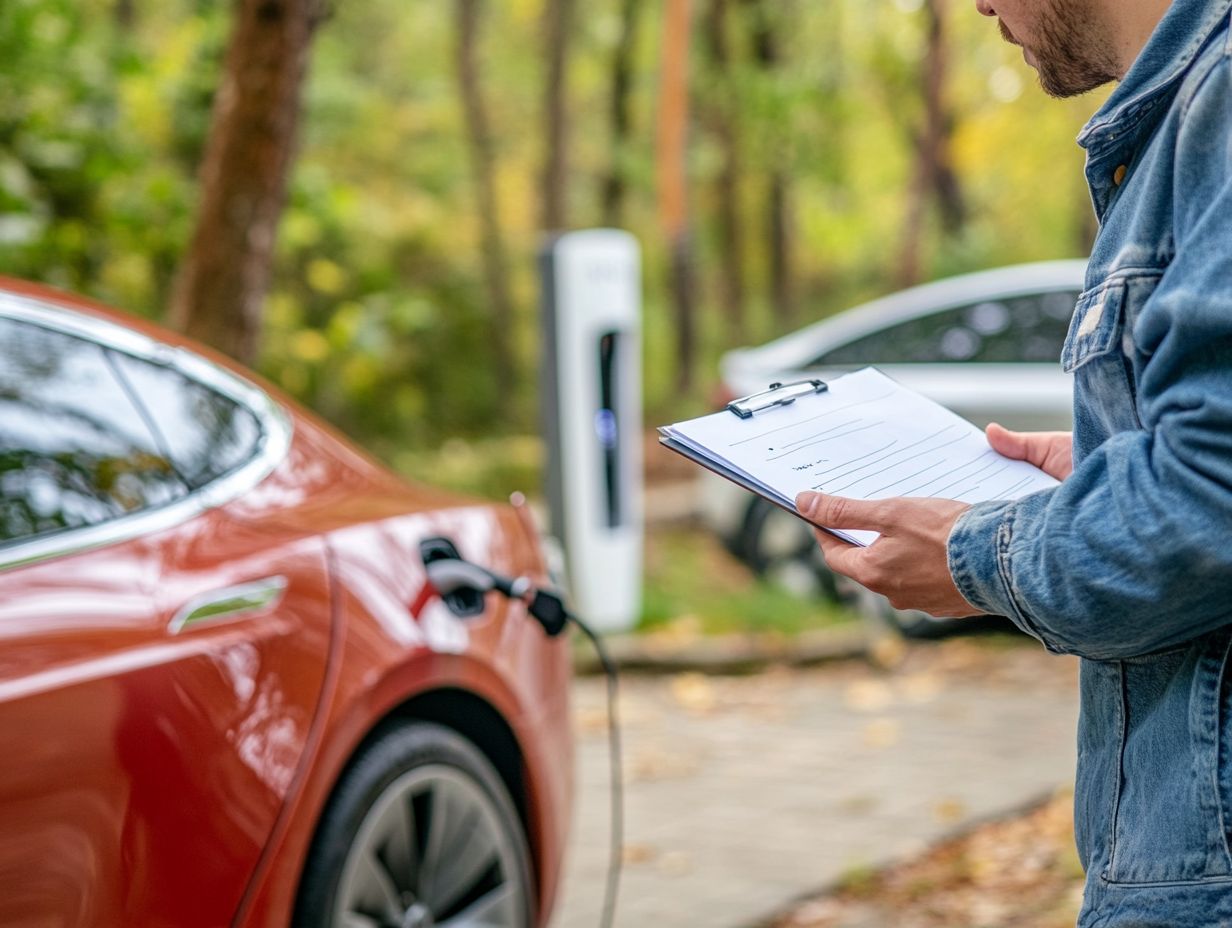
Hybrid and electric vehicles differ significantly in technology and performance. These differences affect your driving experience and overall efficiency.
Hybrid vehicles combine gasoline engines and electric motors. This combination offers extended driving range and impressive fuel economy benefits.
Electric vehicles rely solely on electric motors, providing you with instantaneous torque and a quieter ride. Understanding these distinctions helps you determine which option suits your driving habits and lifestyle.
Hybrids often deliver superior fuel economy on longer trips. They seamlessly switch between power sources, maximizing efficiency during highway driving.
Electric vehicles shine in urban settings. Frequent stops allow for a system that helps recharge the battery when you slow down.
Hybrids feature a more complex powertrain. They include additional components like batteries and a combustion engine.
Electric vehicles streamline this with a single electric motor, ultimately lowering your maintenance costs over time. Each type of performance will resonate differently with you.
Consider efficiency metrics and the overall driving experience when making your choice.
Factors to Consider When Choosing Between Hybrid and Electric
When deciding between hybrid cars and electric cars, consider how to choose the right EV for your lifestyle by weighing several key factors. This ensures your choice resonates with your personal preferences and needs.
Consider the costs associated with vehicle ownership. This includes the initial purchase price, maintenance expenses, and long-term fuel costs.
Reflect on your driving habits, such as the distance of your daily commute. Your access to charging stations will also guide you in making an informed choice.
By fully leveraging the advantages of either hybrid or electric technology, you can make the best decision.
Cost and Maintenance
Understanding the cost and maintenance implications of hybrid and electric cars is essential. This knowledge helps you make a well-informed decision that aligns with your budget and long-term financial aspirations.
While hybrids may present a more accessible price tag at purchase, weigh the perks of electric vehicles. These include tax incentives and rebates that can significantly lessen your initial investment.
Over time, the reduced dependence on fuel and lower maintenance needs of electric models can lead to substantial cost savings.
The positive trends in the resale value of electric cars enhance their appeal as a long-term investment. Take time to consider these financial factors to align your vehicle choices with your economic priorities and sustainability goals.
Environmental Impact
The environmental impact of hybrid and electric vehicles attracts eco-conscious consumers. This is especially true amid growing concerns about climate change and air quality.
Hybrid vehicles offer lower emissions compared to traditional cars. Electric vehicles take it a step further by producing zero tailpipe emissions, making them the more sustainable choice.
By prioritizing renewable energy sources for charging electric vehicles, you can amplify your environmental contributions. This action significantly reduces your carbon footprint.
This shift toward innovative transportation solutions is crucial for cutting down greenhouse gas emissions. More people, including you, recognize the importance of sustainable mobility.
The carbon intensity of the fuel sources used to generate electricity greatly influences the overall environmental benefits of electric vehicles. Choosing green energy enhances their sustainability.
As battery technology progresses and recycling methods improve, the ecological footprint associated with producing electric vehicles shrinks. This gives you confidence that your choices pave the way for a cleaner future.
Investing in these eco-friendly modes of transport is not just a personal decision; it s part of a larger movement. This movement aims at tackling urban pollution and fighting climate change.
Driving Habits and Needs
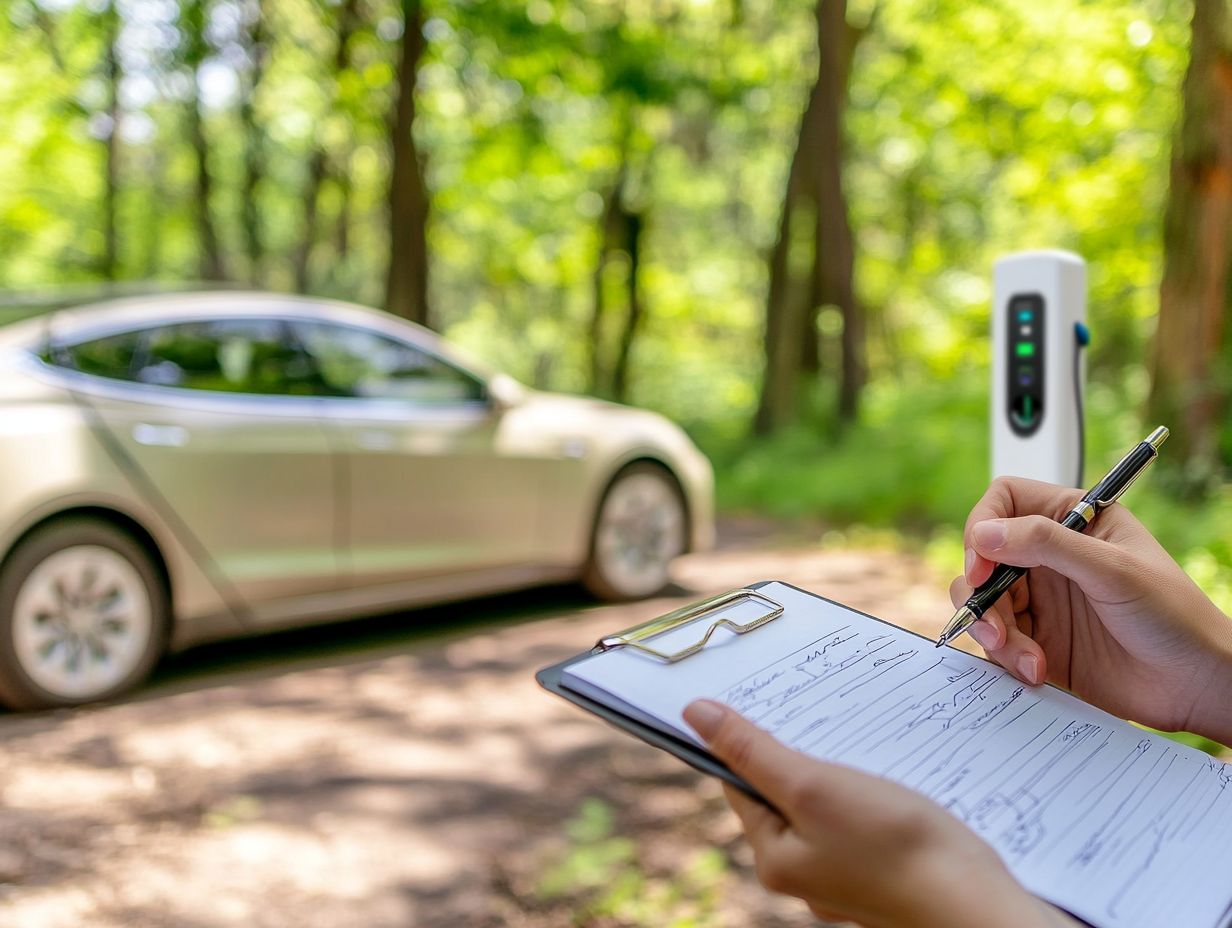
Evaluating your driving habits and needs is crucial when choosing between hybrid cars and electric vehicles. These factors significantly impact the effectiveness and convenience of your selection.
If you have long commutes or lack adequate access to charging stations, hybrid vehicles can ease your concerns about range anxiety while delivering better fuel economy.
If your driving patterns align with electric cars, their low emissions and reduced operating costs can enhance your overall driving experience.
Understanding the distinctions between these vehicle types helps you make a more informed decision. If you frequently navigate urban environments with stop-and-go traffic, you might find the regenerative braking feature which helps recharge the battery when slowing down of electric models particularly beneficial.
The availability of charging stations can sway city dwellers who appreciate the benefits of eco-friendly driving.
If you’re planning longer road trips, hybrids offer the versatility of dual energy sources, making them an excellent choice for those who value sustainability and convenience.
Making the Decision: Which is Right for You?
Choosing between hybrid cars and electric cars calls for careful reflection on your unique circumstances, preferences, and values.
Consider all the factors like cost, how it affects the environment, driving habits, and vehicle features to make your best choice.
Whether you lean towards the practicality of a hybrid or the sustainability of an electric vehicle, clarifying your priorities will illuminate your path in this decision-making journey.
Evaluating Your Priorities
Evaluating your priorities is essential in determining whether a hybrid car or an electric car aligns with your values and driving needs. Consider factors like cost, maintenance, how it affects the environment, and personal convenience.
Identify what matters most be it long-term savings or eco-friendliness. This will help clarify which type of vehicle suits your lifestyle best.
Understanding your driving habits is crucial. If you often embark on longer trips, hybrids might catch your eye with their extended range and fuel flexibility.
If you’re navigating city streets with shorter commutes, you might find yourself drawn to the low maintenance and eco-friendly perks of an electric vehicle.
By weighing these factors, you can navigate your options effectively, ensuring your final choice is financially sound and in harmony with your environmental values and everyday needs.
Test Driving and Researching Models
Test driving and researching various models of hybrid and electric cars are essential steps in ensuring your purchasing decision aligns perfectly with your preferences and needs.
Engage with dealerships while utilizing online resources to compare vehicle features, performance, and pricing. This will give you a comprehensive understanding of what each model offers.
By experiencing the cars firsthand, you can familiarize yourself with their handling and comfort and assess how each option fits into your lifestyle.
This proactive approach enables you to weigh the pros and cons of each vehicle, ensuring you select one that meets your environmental concerns and budget constraints.
Delving into user reviews and expert analyses can illuminate long-term ownership experiences, making your choice clearer and more fulfilling.
Now is the perfect time to explore your options! Find the vehicle that fits your lifestyle today.
Frequently Asked Questions
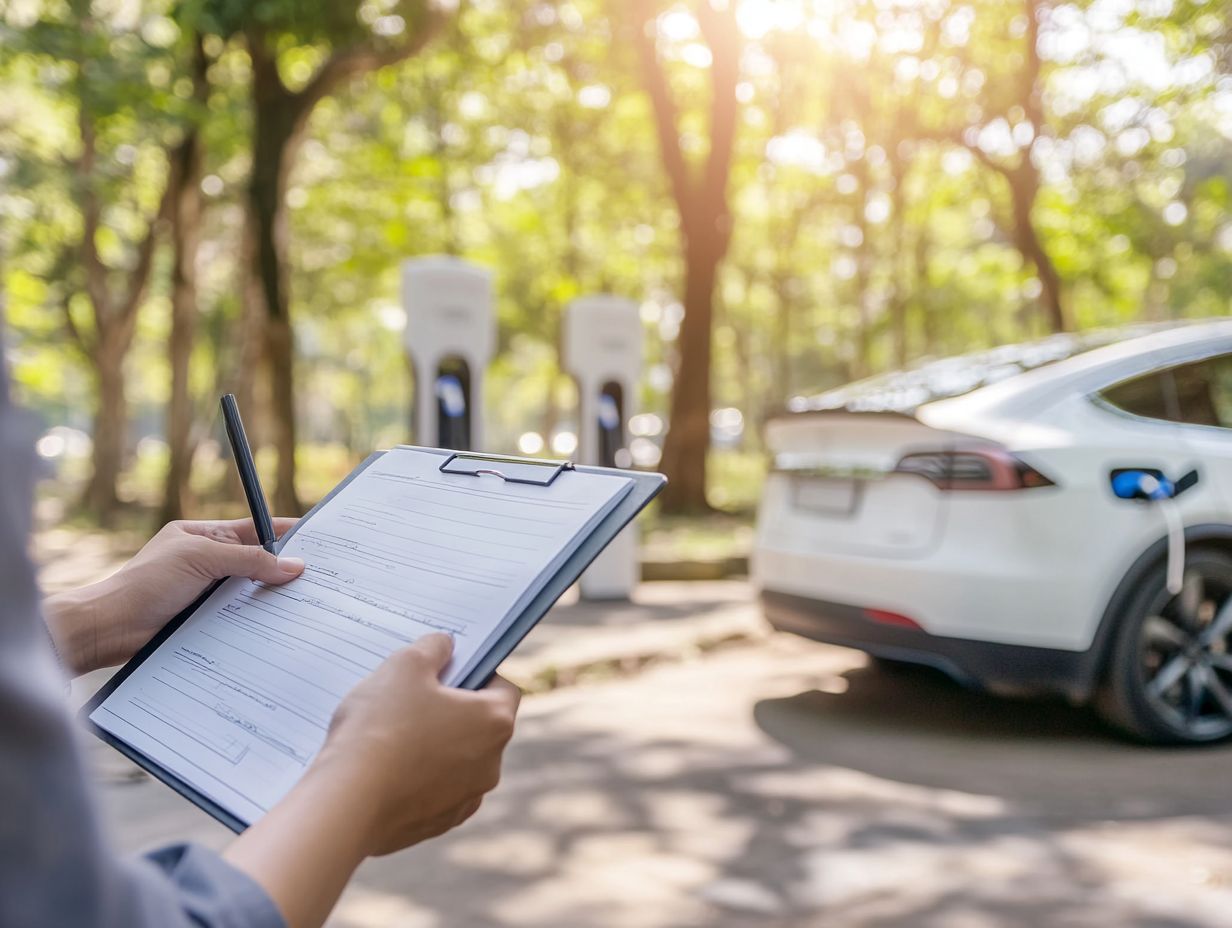
1. How do I decide between buying a hybrid or an electric car?
Choosing between a hybrid and an electric car depends on your needs. Think about your daily driving distance, budget, and charging station access.
2. What is the main difference between a hybrid and electric car?
A hybrid car uses both a gasoline engine and an electric motor. In contrast, an electric car runs solely on electricity, meaning it has zero emissions and doesn t need gasoline.
3. Which option is more environmentally friendly: hybrid or electric?
Electric cars are more environmentally friendly because they produce no emissions. Both hybrid and electric models, however, are greener than traditional gasoline cars.
4. Are there any cost differences between a hybrid and electric car?
Electric cars usually have a higher upfront cost than hybrids. Still, their lower fuel and maintenance costs often make them more cost-effective over time.
5. Can I take a hybrid or electric car on a long-distance road trip?
You can take both hybrid and electric cars on long-distance trips. Just plan for charging or gas stations along your route based on your vehicle type.
6. How can I determine the best choice for me: hybrid or electric?
Evaluate your daily driving habits, budget, and any tax incentives for electric cars. Test drive both options to find the right fit for your lifestyle.

